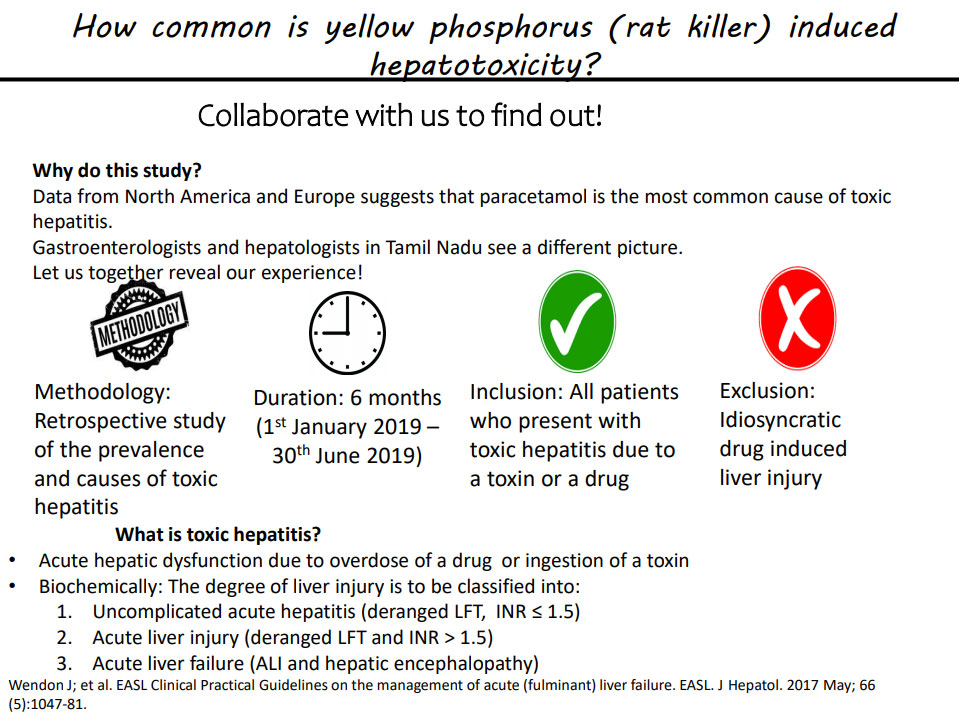Prevalence and causes of Toxic
hepatitis across Tamil Nadu – a
retrospective hospital based study.
Background
- In the West, Paracetamol overdose is the commonest cause of
toxic hepatitis.
- Yellow phosphorus (Rat killer Poison) is the one of the
commonest cause of toxic hepatitis in Tamil Nadu- though not
commonly recognised outside of southern India.
- Documenting this will lead to increased awareness and steps
to prevent / treat this problem in Tamil Nadu.
Objectives
- To study the prevalence and causes of toxic hepatitis across
Tamil Nadu – a retrospective hospital based study.
Study period
- 1st January 2019 – 30th June 2019
Definition of Toxic Hepatitis
Acute hepatic dysfunction due to
- Overdose of a drug
- Ingestion of a toxin / poison
The degree of liver injury is to be classified into:
Acute hepatic dysfunction due to
- Uncomplicated acute hepatitis (ie. deranged LFT, INR ≤ 1.5)
- Acute liver injury / ALI (ie. deranged LFT and INR > 1.5)
- Acute liver failure / ALF (ie. ALI and hepatic encephalopathy)
Inclusion Criteria
Acute hepatic dysfunction due to
- All patients who present with toxic hepatitis due to ingestion
of a toxin (ex: rat killer) or due to overdose of a drug (ex:
paracetamol) are to be reported for inclusion in the study
Exclusion Criteria
- Idiosyncratic drug induced liver injury (ie. liver injury
occurring, while taking the correct dose of drug)
Expected outcome
- Rat killer (yellow phosphorus) induced hepatotoxicity is the
commonest cause of toxic hepatitis in Tamil Nadu.
- Public health measures are needed to prevent / reduce this
form of hepatotoxicity
Proforma
- Patient initials:
- Age: Sex: Village/Town:
- Date of alleged ingestion of toxin / drug overdose
- Type of toxin ingestion: accidental / suicidal / homicidal
– If suicidal intent alleged reason for toxin ingestion:
- Marital discord: Exam stress: Other::
- Name of toxin / drug overdose: Dose taken :
- Underlying psychiatric illness (ex: depression):
- Prior suicide attempt
Proforma (continued)
- Liver function test results
- Viral serology results, if tested for: HBsAg / HCV ab / IgM HAV / IgM
HEV
- Creatinine
- USG abdomen – to rule out cirrhosis liver
Treatment given
- In Emergency dept / Casualty.
- On admission to ICU / HDU / ward: Pharmacotherapy (please mention any
particular drug used to treat), plasma exchange (PLEX), liver transplant.
- Survival at end of hospital stay :
- Died
- Referred to a higher centre for further treatment. (please mention
name of centre so that they can be followed)
- Discharged home well
IRB (institutional review board / ethics committee)
- In Emergency dept / Casualty.
- Please get IRB clearance from your respective institutions.
- No funding or sponsors will be provided for the study.
- Referred to a higher centre for further treatment. (please mention
name of centre so that they can be followed)
Authors, in case of publication of study
findings
- 1 Author from one centre for each centre contributing 2 cases
- Please get IRB clearance from your respective institutions.
- 1 Author from one centre for each centre contributing 2 cases
- 3 Authors from one centre for each centre contributing 10 or
more cases
- Order of Centre will be according to the number of cases
contributed
- Confidentiality will be maintained for all patient details
- Institution data will also be anonymised – hence study details
for example: outcomes etc – cannot be traced back to any
institution.
- Institution data will also be anonymised – hence study details
for example: outcomes etc – cannot be traced back to any
institution.
Contact
- E mail id:ratkillertnisgstudy@gmail.com
- Proforma will be soon available in TNISG website
- Proforma and details of study will be shared in the above
mentioned email also.
- Please feel free to contact for any clarification related to the
study in the above mail.
- Last date for sending data is January 31st 2020
Contact
- E mail id:ratkillertnisgstudy@gmail.com
- Proforma will be soon available in TNISG website
- Proforma and details of study will be shared in the above
mentioned email also.
- Please feel free to contact for any clarification related to the
study in the above mail.
- Last date for sending data is January 31st 2020

